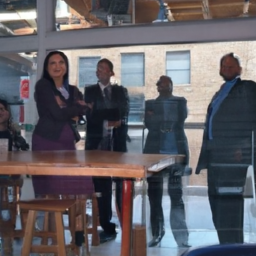The decision made by the FTC to outlaw noncompete clauses could have positive effects for startups, although there is a chance it could be challenged and overturned. The FTC voted 3-2 to prohibit the use of most noncompete agreements, which means companies can no longer make non-senior executive employees wait before working for a competitor or starting their own business in the same field. This ruling will mainly affect industries like financial services and hedge funds where noncompete agreements are common, but it could also have implications for startups.
The ban could bring some benefits for startup founders and hiring managers. It may expand the potential candidates for hiring, according to Nick Cromydas, the co-founder and CEO of Hunt Club, a startup focused on hiring and recruiting.
Cromydas believes that there will be increased collaboration between companies who are knowledgeable about different business models and industries. He predicts that there will be a rise in hiring individuals with specific expertise in a particular field.
Ryan Vann, who specializes in employment law as a partner at Cooley, also shared his perspective. He mentioned that he has worked with clients who were hesitant to recruit talented individuals from bigger companies because they were worried about potential legal actions due to noncompete agreements.
Prohibiting noncompete agreements could potentially motivate startups to build a positive company culture that naturally retains employees, rather than relying on legal threats to enforce loyalty, according to Cromydas.
There are individuals in the startup community who are pleased with the recent decision made by the FTC, which is uncommon given the usual reactions to their rulings. Sarah Guo, the founder of Conviction, a venture capital firm focused on AI, expressed her support for the ban on noncompete agreements, stating that it is a positive development for innovation. Cole Harrington, the co-founder and CEO of ThoughtWave AI, also agreed with her.
It is understandable that some startup CEOs are concerned about how the elimination of noncompete agreements could affect the protection of their intellectual property. However, Cromydas suggests that there are alternative methods for companies to safeguard their assets. Startups can require employees to sign non-disclosure agreements to protect intellectual property, or invest more resources in patent filings. Rather than restricting an employee’s future job opportunities, these approaches aim to prevent the misuse of a former employer’s intellectual property knowledge in a new role.
According to Vann, employees at startups may not notice a significant difference for two main reasons: noncompete agreements were already difficult to enforce, and they were becoming less popular among startups. Some states, like California where many startups are located, already have laws that limit the use of these agreements. However, Vann mentioned that his clients still tend to use them when possible, even though they are rarely enforced.
According to Vann, enforcing a noncompete agreement in American courts is very difficult without additional evidence of wrongdoing, such as stealing confidential information or soliciting customers before leaving a company. Litigation is usually only pursued when there is strong evidence of misconduct or trade secret misappropriation.
Based on company data from Hunt Club, noncompete agreements are becoming less popular. Five years ago, 90% of offers on Hunt Club’s platform included a noncompete agreement, but now only about 40% do. However, Cromydas mentioned that noncompetes may be on the rise in industries like AI where intellectual property is important and competition for skilled workers is fierce.
If startup CEOs currently have noncompete agreements with their employees, they should not take any action, as Vann believes that the ban may not be enforced. There have been several lawsuits filed against the ruling, including one by the U.S. Chamber of Commerce and another by tax service firm Ryan LLC.
Vann believes that many courts may overturn this potential ban. If the ban is successfully removed, startups will have an easier time ending current noncompete agreements for employees they want to hire.
“If you are a new company and hire someone with a noncompete agreement, the worst thing that can happen is that you simply need to notify them that the noncompete cannot be enforced,” explained Vann. “I suggest keeping things as they are for now and keeping an eye on the situation.”

